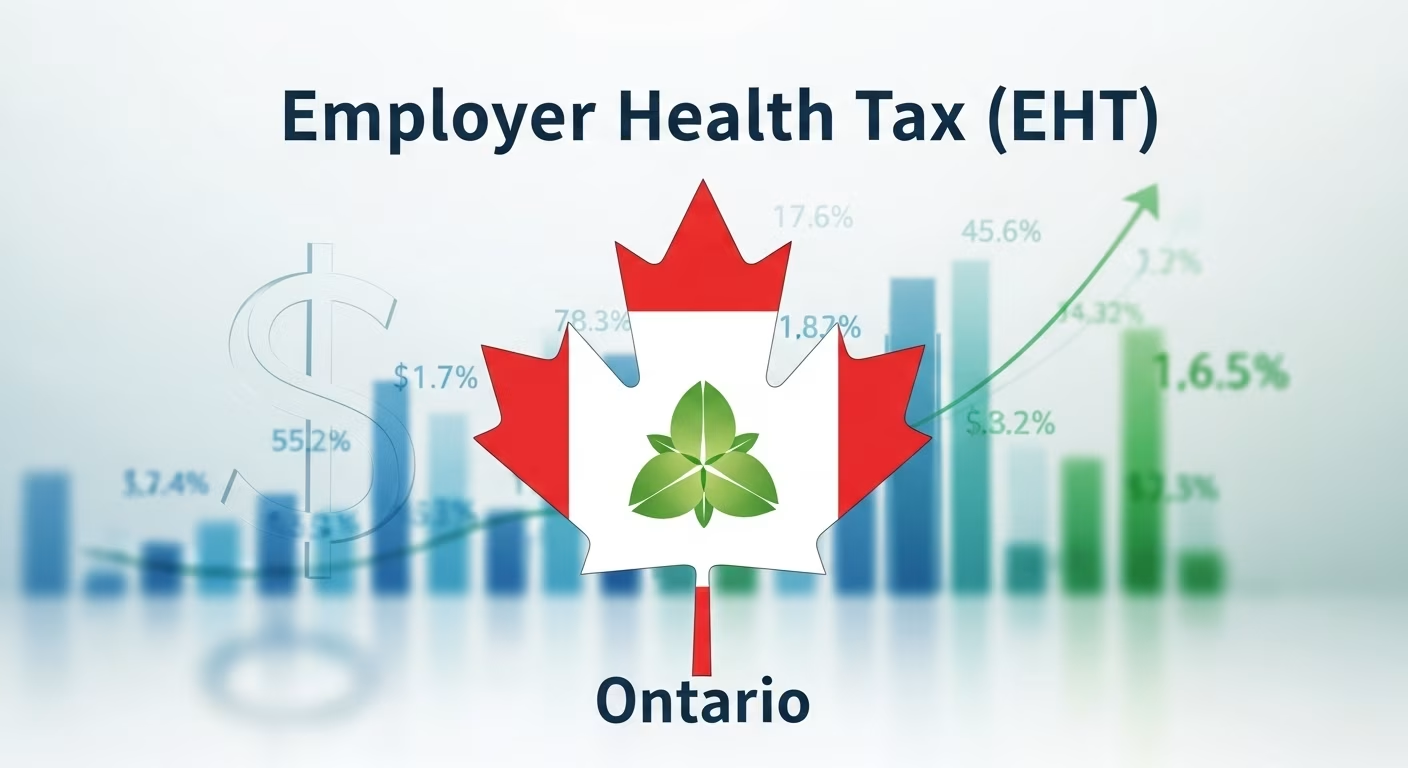Understanding the Employer Health Tax (EHT) in Ontario
Managing a business in Ontario means staying compliant with several provincial tax obligations, and one of the key ones is the Employer Health Tax (EHT). This tax applies to most employers who pay wages or salaries in Ontario and helps fund the province’s healthcare system.
Understanding how the Employer Health Tax Act works, who must pay, and how to file correctly is essential for avoiding penalties. This guide explains the EHT rates, thresholds, and filing process, and how GTA Accounting helps Ontario employers stay compliant.
What Is the Employer Health Tax?
The Employer Health Tax is a mandatory contribution that certain employers must pay based on the total remuneration paid to employees. Unlike CPP and EI, which are federal programs, EHT is specific to Ontario and regulated under the Employer Health Tax Act.
Who Is Required to Pay EHT in Ontario?
All employers who have a permanent establishment in Ontario and pay employees working in the province may be subject to EHT. This includes:
- Corporations
- Partnerships
- Sole proprietors
- Non-profit and charitable organizations (subject to specific exemptions)
Employers with payroll below the annual exemption threshold may not be required to pay EHT, but they must still register and file an annual return to claim the exemption.
Difference Between Employer Health Tax and Employee Health Deductions
A common misconception is that EHT is deducted from employees’ pay. In reality, EHT is paid by the employer, not the employee. It is separate from any employee health or insurance deductions made through payroll.
Employer Health Tax Act and Key Compliance Rules
Overview of the Employer Health Tax Act
The Employer Health Tax Act governs the calculation, filing, and payment of EHT in Ontario. It outlines the responsibilities of employers, available exemptions, and penalties for late filing or non-compliance. Understanding this legislation is critical for maintaining accurate payroll records and avoiding unnecessary penalties.
Employer Eligibility and Threshold Limits for 2025
For 2025, the EHT exemption threshold remains at $1 million for eligible employers. Businesses with Ontario payroll under this limit are exempt from paying EHT, but they must file to report eligibility.
Employers with payroll exceeding $1 million are required to pay EHT on the portion above the exemption threshold. Large employers with payroll over $5 million do not qualify for the exemption.
Exemptions and Special Rules for Small Businesses
Ontario provides relief for small employers by allowing them to claim the $1 million exemption. Associated corporations must share the exemption, meaning that if multiple related companies operate under the same control, they can only claim one combined exemption.
How to Calculate Employer Health Tax in Ontario
2025 EHT Rates and Calculation Formula
The EHT rate depends on the total Ontario payroll. For most employers, the rate ranges from 0.98% to 1.95%, depending on payroll size.
For example:
- Payroll up to $200,000: 0.98%
- Payroll between $400,000 – $400,000+: rates increase gradually
- Payroll above $400,000+: up to 1.95%
The formula for calculating EHT is:
EHT Payable = (Total Ontario Payroll − Exemption) × Applicable Rate
Payroll Components Included in EHT Assessment
EHT applies to all forms of remuneration, including:
- Salaries and wages
- Bonuses and commissions
- Vacation pay
- Stock options and taxable benefits
- Directors’ fees and allowances
Example: Calculating EHT for Ontario Employers
If an employer’s total Ontario payroll in 2025 is $1.6 million:
- Exemption: $1 million
- Taxable payroll: $600,000
- EHT at 1.95% = $11,700 payable
This example shows how easily EHT can affect mid-sized businesses and why proper calculation is important.
Filing and Payment Process for EHT
How to File Employer Health Tax in Ontario
Employers can file their Employer Health Tax returns through the Ontario e-Services portal.
The filing involves:
- Registering for an Employer Health Tax account
- Calculating the annual EHT liability
- Submitting the EHT annual return online
Using the Employer Health Tax Ontario Login Portal
The Employer Health Tax Ontario login allows businesses to manage their filings, make payments, and check past submissions. It’s essential to use the correct Ontario Employer Health Tax login credentials linked to your business number (BN).
Filing Deadlines and Payment Methods in 2025
For most employers, the EHT annual return is due by March 15, 2026, for the 2025 tax year.
Employers with larger payrolls must also make monthly instalment payments. Missing a deadline may result in interest and penalty charges under the Employer Health Tax Act.
Common Filing Errors and Penalties
Common Mistakes Ontario Employers Make
Many Ontario employers make avoidable errors during EHT filing, such as:
- Misclassifying employee compensation
- Forgetting to register for EHT
- Failing to share the exemption among associated corporations
- Missing filing deadlines
Penalties for Late or Inaccurate EHT Filing
The Ministry of Finance may impose:
- Interest on unpaid balances
- Penalties for late filing
- Additional assessments during an EHT audit
Even small calculation errors can lead to unexpected costs, especially if your business is subject to an audit.
How to Correct an EHT Filing Error
If an employer discovers an error after filing, they can submit a voluntary disclosure or an amended return through the Ontario e-Services portal. Professional tax support ensures that corrections are handled properly without triggering penalties.
How Professional Tax Services Can Help
Benefits of Using a CPA for EHT Compliance
Hiring a CPA for Employer Health Tax compliance helps ensure accurate reporting and proper use of exemptions. A professional accountant can review your payroll structure, calculate EHT correctly, and file returns on time to prevent penalties.
How GTA Accounting Assists with EHT Filing and Payroll Compliance
At GTA Accounting, we help Ontario employers manage their payroll tax obligations efficiently. Our services include:
- Payroll tax compliance to handle calculations and filings
- Corporate tax filing to manage both federal and provincial obligations
- Tax planning and consulting to reduce unnecessary tax exposure
- Business accounting services to maintain organized records
- CRA audit representation to manage any reviews or inquiries
Our experienced team ensures that your Employer Health Tax filing aligns with current regulations and that you remain compliant year-round.
Final Thoughts
Staying Compliant with Ontario’s Employer Health Tax in 2025
The Employer Health Tax remains a key component of Ontario’s payroll obligations. Staying updated with annual changes, threshold adjustments, and filing requirements is essential for all employers, regardless of business size.
When to Seek Professional Assistance
If your business payroll exceeds the exemption threshold or if you operate multiple corporations, professional guidance from GTA Accounting can save you time and prevent compliance risks. Our team supports Ontario employers with complete payroll and tax management solutions.
Need help filing your Employer Health Tax (EHT) for 2025?
Contact GTA Accounting today for accurate filing, compliance support, and ongoing payroll tax management across Ontario.





.avif)



